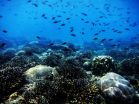(Press-News.org) The success of corals that adapt to survive in the world's hottest sea could contribute to their demise through global warming, according to new research.
Researchers from the University of Southampton and the New York University Abu Dhabi found that local adaptation to high salinity levels in the southern Persian/Arabian Gulf (PAG) may prevent coral escaping their fate, as they lose their superior heat tolerance in waters with normal salinity levels.
The research is published this week in The ISME Journal, a world leading publication platform for ecological research, from where it can be freely accessed via http://www.nature.com/ismej/journal/vaop/ncurrent/full/ismej201580a.html
Warm water corals depend on a vital partnership with unicellular algae of the genus Symbiodinium. Damage to the algal symbiont through heat stress can result in the breakdown of the association, leading to fatal coral bleaching. Most corals fall victim to bleaching at water temperatures above 32ºC. However, corals from the PAG region survive summer peak temperatures of up to 35ºC on a regular basis.
Senior author of the study, Professor Jörg Wiedenmann from Ocean and Earth Science at the University of Southampton, explains: "It was not clear whether this resilience is related to the presence of a new type of symbiotic alga (Symbiodinium thermophilum) that was recently discovered by our team in this region. Therefore, we used molecular markers to identify the algal partners of three coral species along the coast of the southern Gulf and the adjacent Gulf of Oman. We found that this special symbiont indeed seems to play an integral role for coral survival in the world's hottest sea."
The researchers studied corals along 1,000km of coastline in the southern PAG, a region where the world's warmest coral reef habitats are separated from the wider Indian Ocean by the narrow Strait of Hormuz. Notably, the PAG features not only record temperatures, but the water is also exceptionally salty.
Professor Wiedenmann, who runs the University's Coral Reef Laboratory based at the National Oceanography Centre Southampton, continues: "As soon as you leave the Gulf, corals start to host different symbionts. This 'partner exchange' starts when the salinity of the water approaches normal oceanic levels."
Lead-author Dr Cecilia D'Angelo, Senior Research Fellow at the University of Southampton, says: "We have simulated these conditions in our laboratory and found that corals from the Gulf lose their exceptional heat stress tolerance when they need to cope at the same time with salinity levels commonly found in coral reefs elsewhere. This may explain why the PAG-typical coral-alga associations are rarely found in the less salty water or the Gulf of Oman."
Dr D'Angelo adds: "Some corals may potentially escape their fate in waters heated by global warming by shifting their geographic distribution. However, our findings indicate that in addition to barriers such as landmasses, the lack of suitable substrate for settlement and adverse currents, the dependence on certain local environmental conditions may represent an invisible fence that could trap corals in their endangered habitat."
With rising ocean temperatures anticipated to cause a loss of most warm water reefs within the next 100 years, it has been discussed whether heat tolerant corals adapted to hot environments, such as PAG, could be used to replenish reefs damaged by global warming elsewhere.
Professor Wiedenmann comments: "Our results suggest that the transplantation of corals over large geographic distances is not a straight-forward solution to restore reefs since they may struggle to adjust to different environmental factors apart from the temperature in the new habitat. Efforts to protect coral reefs should rather focus on other measures including the reduction of nutrient enrichment, sedimentation, overfishing and destructive coastal development. At the same time all attempts should be made to reduce CO2 emissions to prevent further global warming."
INFORMATION:
References:
Cecilia D'Angelo, Benjamin C.C. Hume, John Burt, Edward G. Smith, Eric P. Achterberg and Jörg Wiedenmann (2015). Local adaptation constrains the distribution potential of heat-tolerant Symbiodinium from the Persian/Arabian Gulf. The ISME Journal, DOI 10.1038/ismej.2015.80
Free download: http://www.nature.com/ismej/journal/vaop/ncurrent/full/ismej201580a.html
Hume, B.C.C. et al. Symbiodinium thermophilum sp. nov., a thermotolerant symbiotic alga prevalent in corals of the world's hottest sea, the Persian/Arabian Gulf. Sci. Rep. 5, 8562; DOI:10.1038/srep08562 (2015).
Free download: http://www.nature.com/srep/2015/150224/srep08562/full/srep08562.html
D'Angelo, C. and Wiedenmann, J. "Impacts of Nutrient Enrichment on Coral Reefs: New Perspectives and Implications for Coastal Management and Reef Survival." Current Opinion in Environmental Sustainability 7, (2014): 82-93.
Free download: http://www.sciencedirect.com/science/article/pii/S1877343513001917
Malaria is a cruel and disabling disease that targets victims of all ages. Even now, it is estimated to kill one child every minute. Recent progress in halting the spread of the disease has hinged on the use of insecticide-treated bed nets and spraying programmes that target the insect that spreads the disease, the African malaria mosquito (Anopheles gambiae). However, the insects are fighting back, developing resistance to insecticides such as pyrethroid that control their numbers, forcing Brian Foy and Jacob Meyers from Colorado State University to think of alternative ...
Report shows 38 MPs have accepted over £60,000 of industry hospitality since 2010
More than half of these MPs are from constituencies where the number of smoking related deaths exceeds the national average
20 of the 38 MPs who accepted hospitality voted against plain packaging
An investigation by The BMJ today asks to what extent is the tobacco industry able to reach out and influence parliamentarians?
It shows that since 2010, 38 MPs -- 29 Conservatives, eight Labour, and one independent -- have accepted over £60,000 worth of tobacco industry hospitality, ...
Cold weather kills 20 times as many people as hot weather, according to an international study analysing over 74 million deaths in 384 locations across 13 countries [1]. The findings, published in The Lancet, also reveal that deaths due to moderately hot or cold weather substantially exceed those resulting from extreme heat waves or cold spells.
"It's often assumed that extreme weather causes the majority of deaths, with most previous research focusing on the effects of extreme heat waves," says lead author Dr Antonio Gasparrini from the London School of Hygiene & Tropical ...
ATS 2015, DENVER -- Chronic obstructive pulmonary disease, or COPD, is associated with increased risk of dying from a cardiovascular disease such as heart failure or a heart attack, as well as diseases not associated with the heart. However, COPD is not by itself associated with increased likelihood of having a stroke or a systemic embolism, according to a new research study.
Researchers from Duke University and the Mayo Clinic reached this conclusion after analyzing data from a large randomized trial of patients with atrial fibrillation, a condition that produces ...
MINNEAPOLIS - People with depression may be more likely to develop Parkinson's disease, according to a large study published in the May 20, 2015, online issue of Neurology®, the medical journal of the American Academy of Neurology.
"We saw this link between depression and Parkinson's disease during over a timespan of more than two decades, so depression may be a very early symptom of Parkinson's disease or a risk factor for the disease," said study author Peter Nordström, PhD, at Umeå University in Umeå, Sweden.
The researchers also examined siblings, ...
DALLAS, May 20, 2015 -- Group behavioral therapy that encouraged walking at home significantly improved and prevented mobility loss among patients with clogged arteries in the legs, according to research in the Journal of the American Heart Association.
Known as peripheral artery disease (PAD), clogged arteries in the legs can cause pain and fatigue while walking. Maintaining mobility is integral to preserving functional independence, social interactions and daily activities.
Although studies have shown that supervised exercise on a treadmill improves walking endurance ...
DALLAS, May 20, 2015 -- Large waistline, cholesterol disorders and other metabolic abnormalities may increase the risk of cardiovascular disease more among black women than among white women, according to new research in Journal of the American Heart Association.
Previous studies have focused primarily on white participants and found that obesity without a clustering of at least three metabolic disorders (metabolic syndrome) was not associated with increased cardiovascular disease risk. The metabolic abnormalities included in the definition of the metabolic syndrome are ...
WEST LAFAYETTE, Ind. - Purdue University research shows that a small amount of nicotinoid pesticide substantially weakens termites' ability to fight off fungal diseases, a finding that could lead to more effective methods of pest control.
The study also provides clues into termites' robust defense systems and how nicotinoids affect social insects.
A team led by Michael Scharf, the O.W. Rollins/Orkin Chair and professor of entomology, found that a sublethal dose of imidacloprid knocked out key microbes in the termite gut and suppressed the social hygiene habits that ...
Rolf Mueller, an associate professor of mechanical engineering in the College of Engineering at Virginia Tech, has developed a prototype of a dynamic sonar system inspired by horseshoe bats.
The prototype was presented Wednesday (May 20) at the Acoustical Society of America meeting in Pittsburgh, Pennsylvania. The principles used in its design could eventually lead to sonar systems much more effective than the best arrays available today.
Because bats use a form of biological sonar called echolocation to navigate and hunt in the dark, they are natural models for man-made ...
Paris, France - May 20, 2015 - Data from the ILUMIEN II trial found that guidance from optimal coherence tomography (OCT) was associated with comparable stent expansion as guidance from intravascular ultrasound (IVUS) in patients undergoing percutaneous coronary intervention (PCI). Results from the study were presented today at EuroPCR 2015, the official annual meeting of the European Association for Percutaneous Cardiovascular Interventions.
Coronary stents must be optimally deployed with full lesion coverage and complete stent expansion to optimize outcomes. Less than ...


